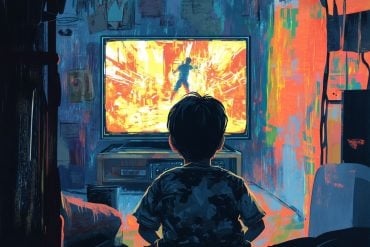Children and teens with autism spectrum disorder (ASD) use screen-based media, such as television and video games, more often than their typically developing peers and are more likely to develop problematic video game habits, a University of Missouri researcher found.
“Many parents and clinicians have noticed that children with ASD are fascinated with technology, and the results of our recent studies certainly support this idea,” said Micah Mazurek, an assistant professor of health psychology and a clinical child psychologist at MU. “We found that children with ASD spent much more time playing video games than typically developing children, and they are much more likely to develop problematic or addictive patterns of video game play.”
Mazurek studied screen-based media use among 202 children and adolescents with ASD and 179 typically developing siblings. Compared to typically developing children, those with ASD spent more time playing video games and less time on social media, such as Facebook. Children with ASD also spent more time watching TV and playing video games than participating in pro-social or physical activities. Conversely, typically developing children spent more time on non-screen activities than on TV or video games.

In another study of 169 boys with ASD, problematic video game use was associated with oppositional behaviors, such as refusing to follow directions or engaging in arguments. Mazurek says carefully controlled research is needed to examine these issues in the future.
“Because these studies were cross-sectional, it is not clear if there is a causal relationship between video game use and problem behaviors,” Mazurek said. “Children with ASD may be attracted to video games because they can be rewarding, visually engaging and do not require face-to-face communication or social interaction. Parents need to be aware that, although video games are especially reinforcing for children with ASD, children with ASD may have problems disengaging from these games.”
Even though Mazurek cautions that too much screen time could be detrimental for children with ASD, she says tapping into what children with ASD enjoy about video games could help researchers and clinicians develop therapies using the technology.
“Using screen-based technologies, communication and social skills could be taught and reinforced right away,” Mazurek said. “However, more research is needed to determine whether the skills children with ASD might learn in virtual reality environments would translate into actual social interactions.”
Notes about this autism research
The study, “Television, Video Game and Social Media Use among Children with ASD and Typically Developing Siblings,” will be published in an upcoming issue of the Journal of Autism and Developmental Disorders. “Video Game Use and Problem Behaviors in Boys with Autism Spectrum Disorders,” was published in Research in Autism Spectrum Disorders. Mazurek also authored an article for The Scientist Magazine about the benefits and possible negative consequences of using screen-based technologies in interventions for children with autism.
Contact: Jesslyn Chew – University of Missouri
Source: University of Missouri press release
Image Source: The Wii video game controller image is available in the public domain.
Original Research: Abstract for “Video Game Use and Problem Behaviors in Boys with Autism Spectrum Disorders” by Micah O. Mazurek and Christopher R. Engelhardt in Research in Autism Spectrum Disorders. Published online February 2013 doi:10.1016/j.rasd.2012.09.008
Abstract for “Television, Video Game and Social Media Use Among Children with ASD and Typically Developing Siblings” by Micah O. Mazurek and Colleen Wenstrup in Journal of Autism and Developmental Disorders. Published online September 2012 doi: 10.1007/s10803-012-1659-9







